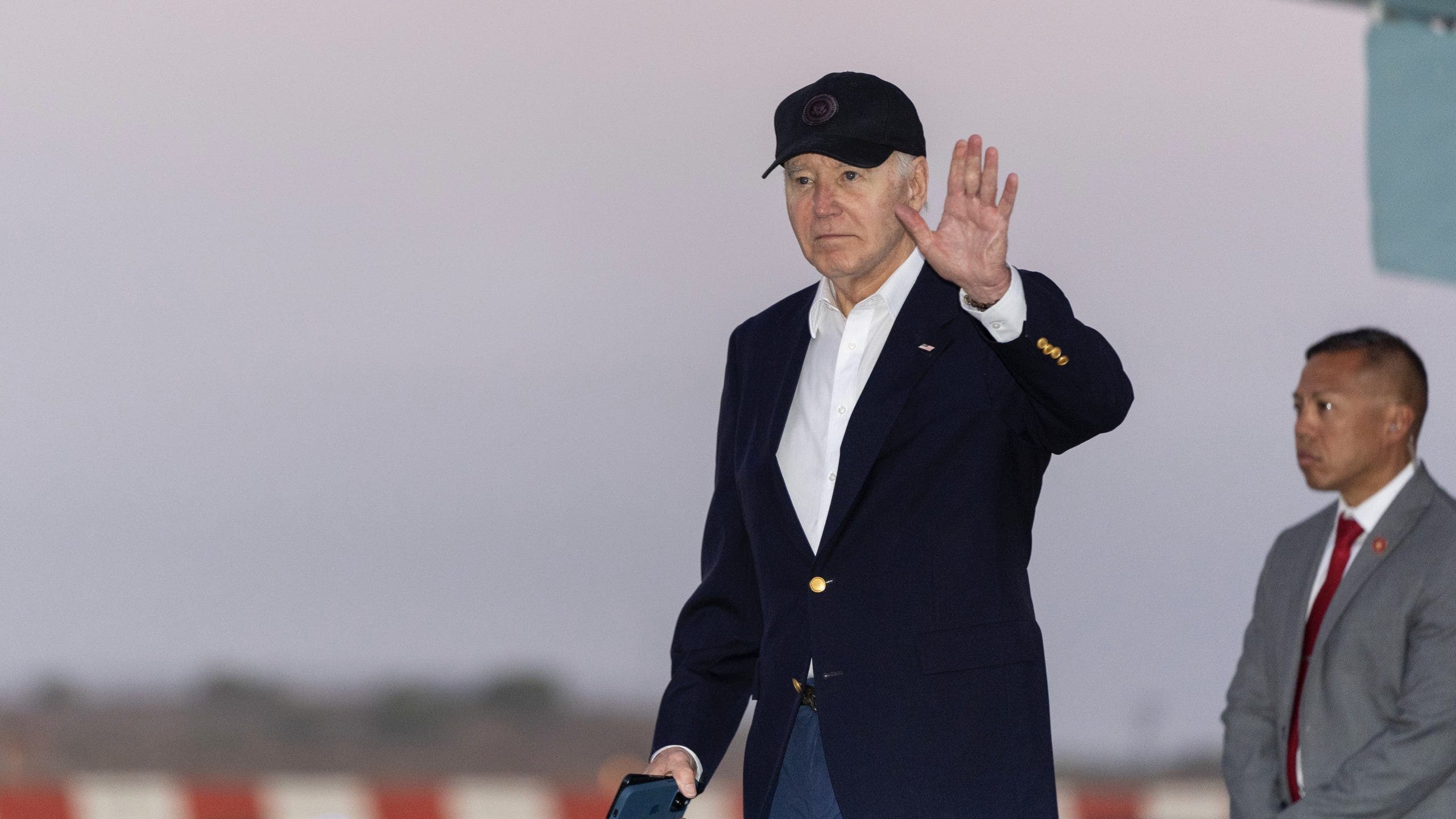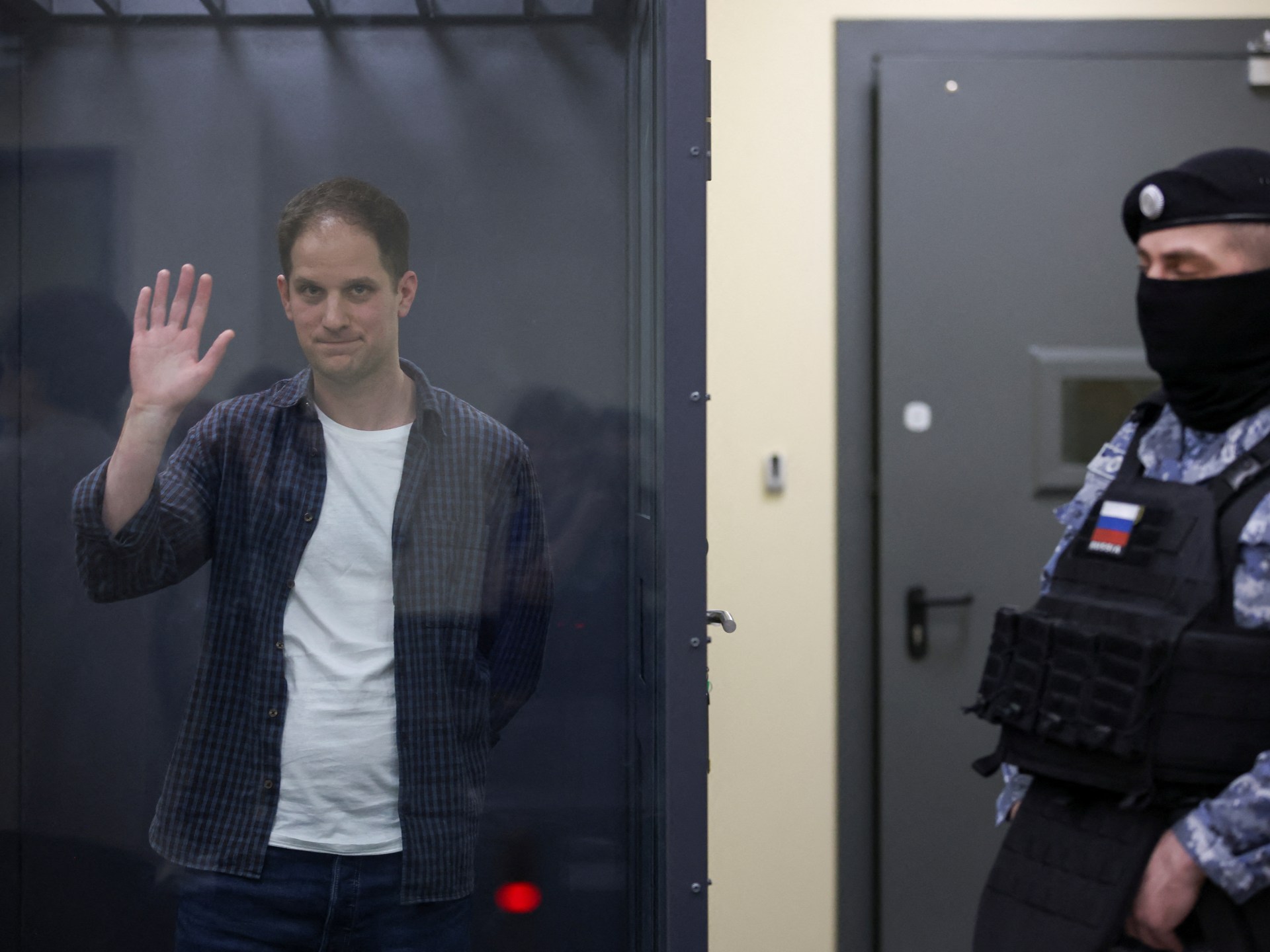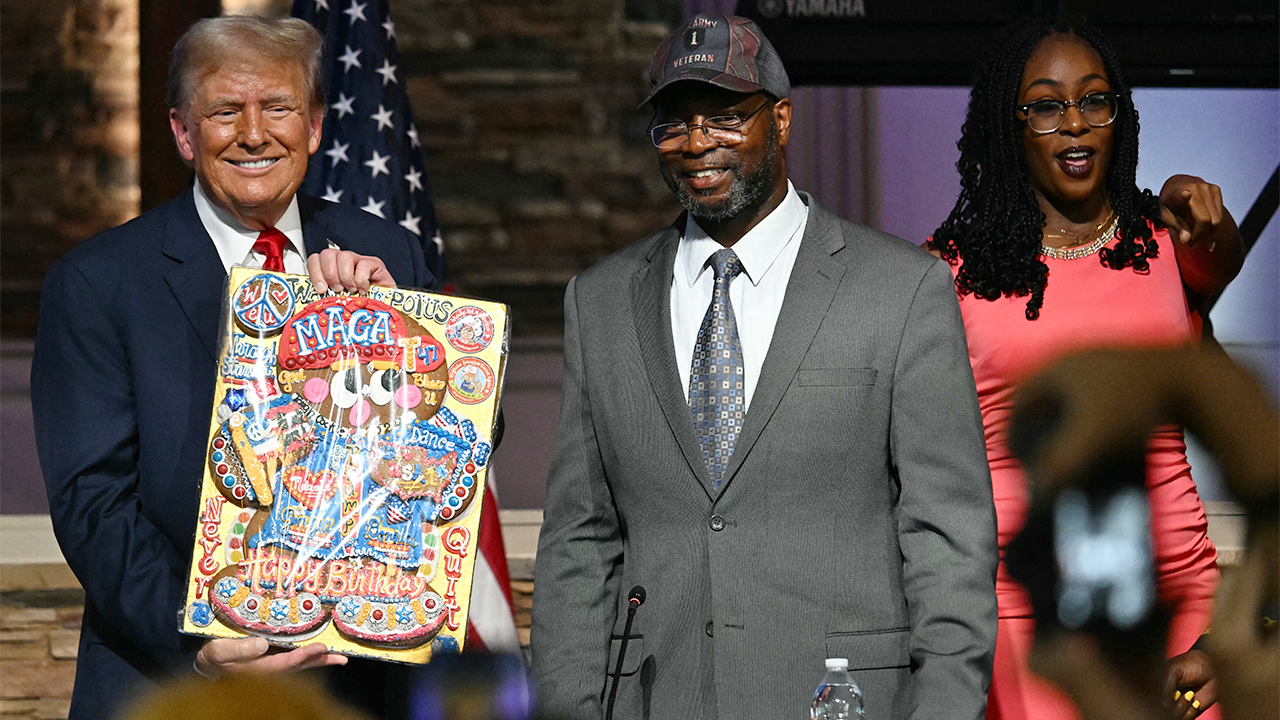Entertainment
In the mystery 'Eric,' desperation and decline manifest into a life-size monster puppet
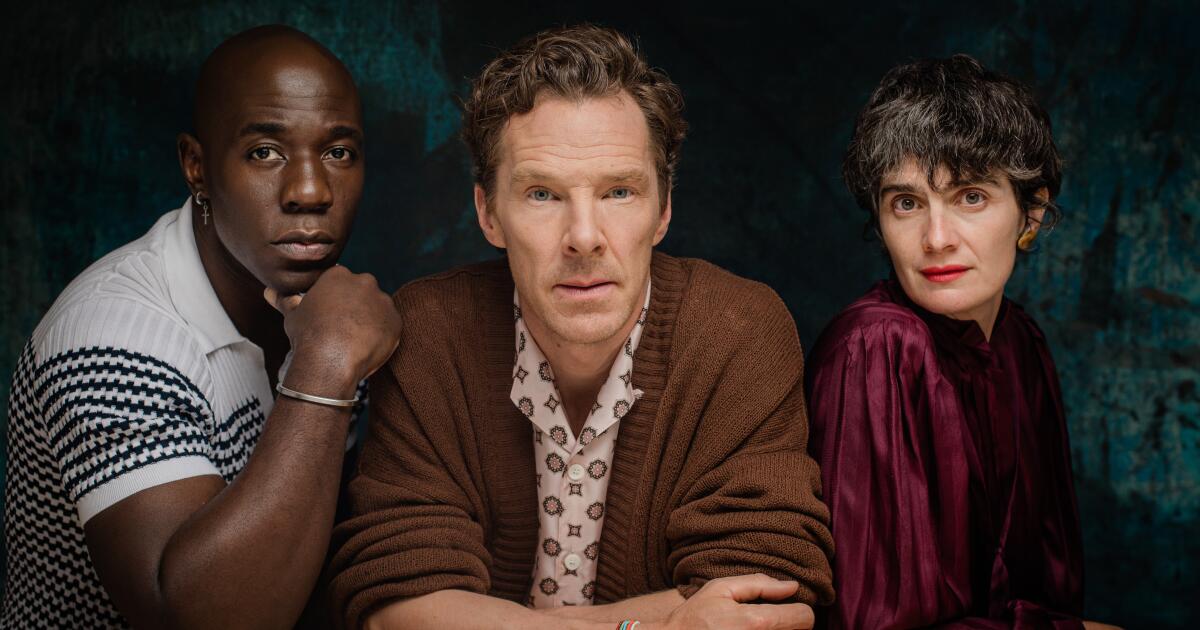
The most idiosyncratic and striking moment on TV this summer? It could be Benedict Cumberbatch as a father running through the streets of New York in a giant, fuzzy blue monster puppet getup amid a desperate attempt to reconnect with his son.
It may sound like some sweet magical adventure, but that’s not the style of British screenwriter Abi Morgan, who created “Eric” for Netflix. She isn’t afraid to tackle big subjects and her body of work — including “Shame” (2011), which tackles sex addiction; “Suffragette” (2015), about women’s suffrage in the U.K.; and TV dramas “The Hour” and “The Split” — often leaves viewers emotionally strung out in its intense examination of human behavior, internal battles and broken systems. And “Eric” is just as visceral.
Set in 1980s New York City, the initial episode of the limited series finds Cumberbatch’s Vincent Anderson, a puppeteer and creator of a “Sesame Street”-esque children’s show “Good Day Sunshine,” exasperated by work demands and his floundering marriage to Cassie (Gaby Hoffmann). The couple’s troubles intensify when their 9-year old son, Edgar (Ivan Howe), goes missing on his walk to school. Torn up by guilt, Vincent is convinced if he turns his son’s drawing of a blue monster, Eric, into a life-size puppet on TV, Edgar will come home. And tasked with investigating the boy’s disappearance is Michael Ledroit (McKinley Belcher III), a Black and queer detective whose closeted identity becomes an obstacle at work as he pursues the case.
Eric, the life-size monster puppet, and Benedict Cumberbatch as Vincent.
(Netflix)
Morgan started with a simple idea: Can we live in a world where a kid can walk to school and come home safely? In exploring that question, the series weaves a lot of issues that plagued the city at the time: rising crime rates, a forgotten underclass, the AIDS epidemic, endemic racism, as well as government mismanagement and corruption.
“There were parallel themes that just became very apparent to me,” Morgan said during a press day with the cast in Los Angeles. “We’re looking at a world where the parents become children and the children become parents in some ways. And the notion of what is a family beyond the nuclear family of the Andersons? There’s a wider family of our city. Who looks after us in the city? Can we trust those parents — be that government, local council or our police force? And when those systems break down and expose themselves, where do we find our new boundaries of trust?”
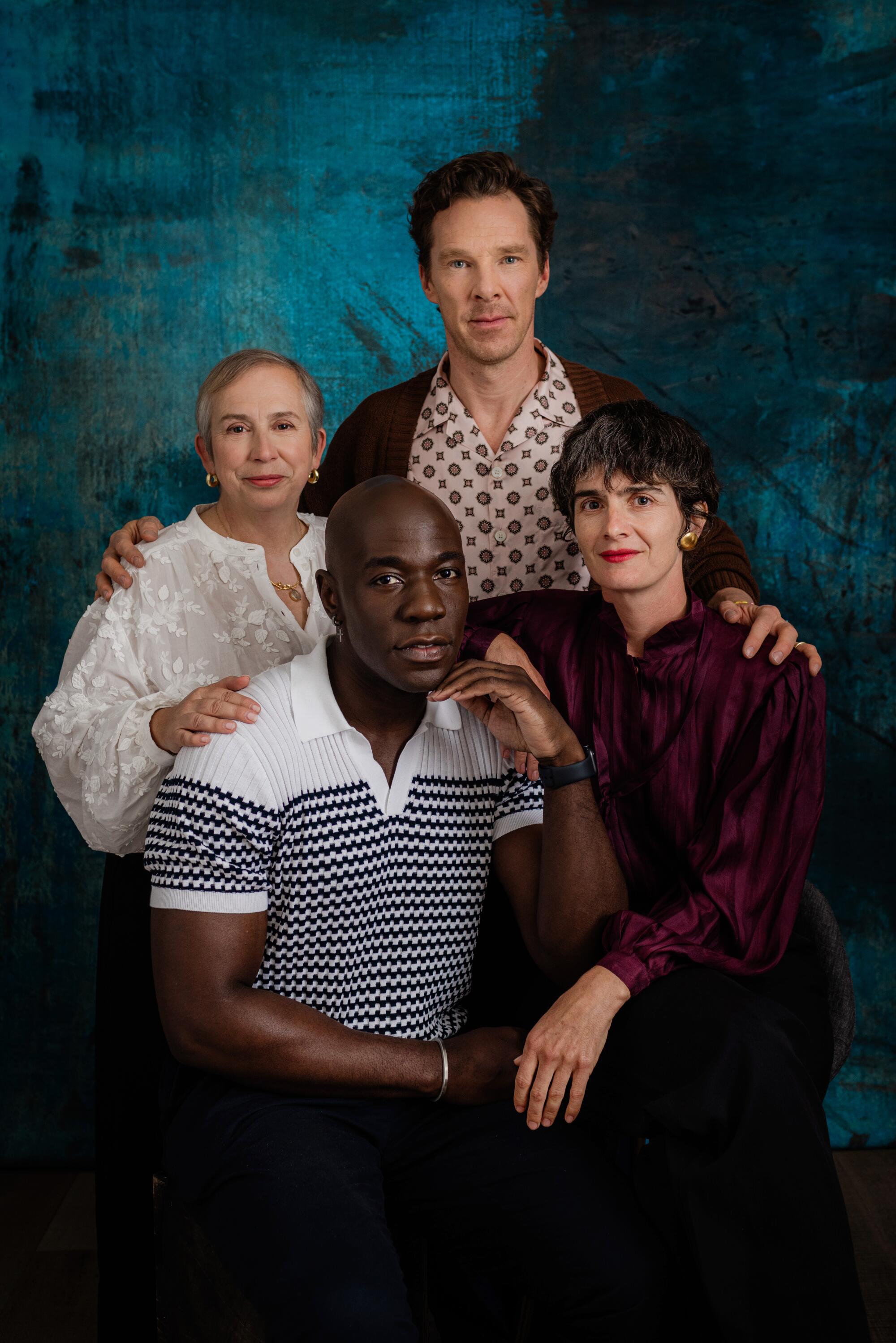
From left, clockwise: Series creator Abi Morgan, Benedict Cumberbatch, Gaby Hoffmann and McKinley Belcher III. Morgan said the show was partly inspired by her time in New York.
(Jason Armond / Los Angeles Times)
Morgan sees the show as a way for audiences to ask themselves those questions through Vincent’s journey. And the city’s many issues presented in the series, inspired by Morgan’s time spent in New York in the ‘80s, added another dimension to the inciting mystery. “There was this dark underbelly. It hadn’t had that cleanup,” she said. “There was something very particular about the ‘80s — it was a melting pot and a point of change, a point of shifting sands, filled with fear and hope, and moments of great freedom and moments of really pushing down that freedom. It felt like a really rich fabric and tapestry in which to set ‘Eric.’”
With no shortage of real and existential horror lurking outside, Morgan knew from the beginning she wanted to bridge the story with a space that provided safety and comfort. Influenced by her own childhood spent backstage with her theater director father, observing how sets were created and the way costumes came to life, she saw “Good Day Sunshine” as a contrast to the city’s roughness and a way to dig deeper into how Vincent, who begins the series already on shaky ground before his mental health declines further, copes with his reality.
“He’s trying to re-create his childhood and idealizing something that was less than ideal,” Cumberbatch said. “His mental health crisis was brushed under the carpet with pharmaceuticals and very cold, cut-off, loveless parenting … he’s invested so much of himself in that show from a need that was never satisfied in his childhood.”
Morgan added that “Good Day Sunshine” is a world that Vincent can control, unlike his own, and that the puppets give life to his voices as he struggles with his mental health and alcoholism. It’s also a way to signal the value of pursuing a creative life, which stands in contrast to that of his estranged parents, particularly his father, a wealthy developer.
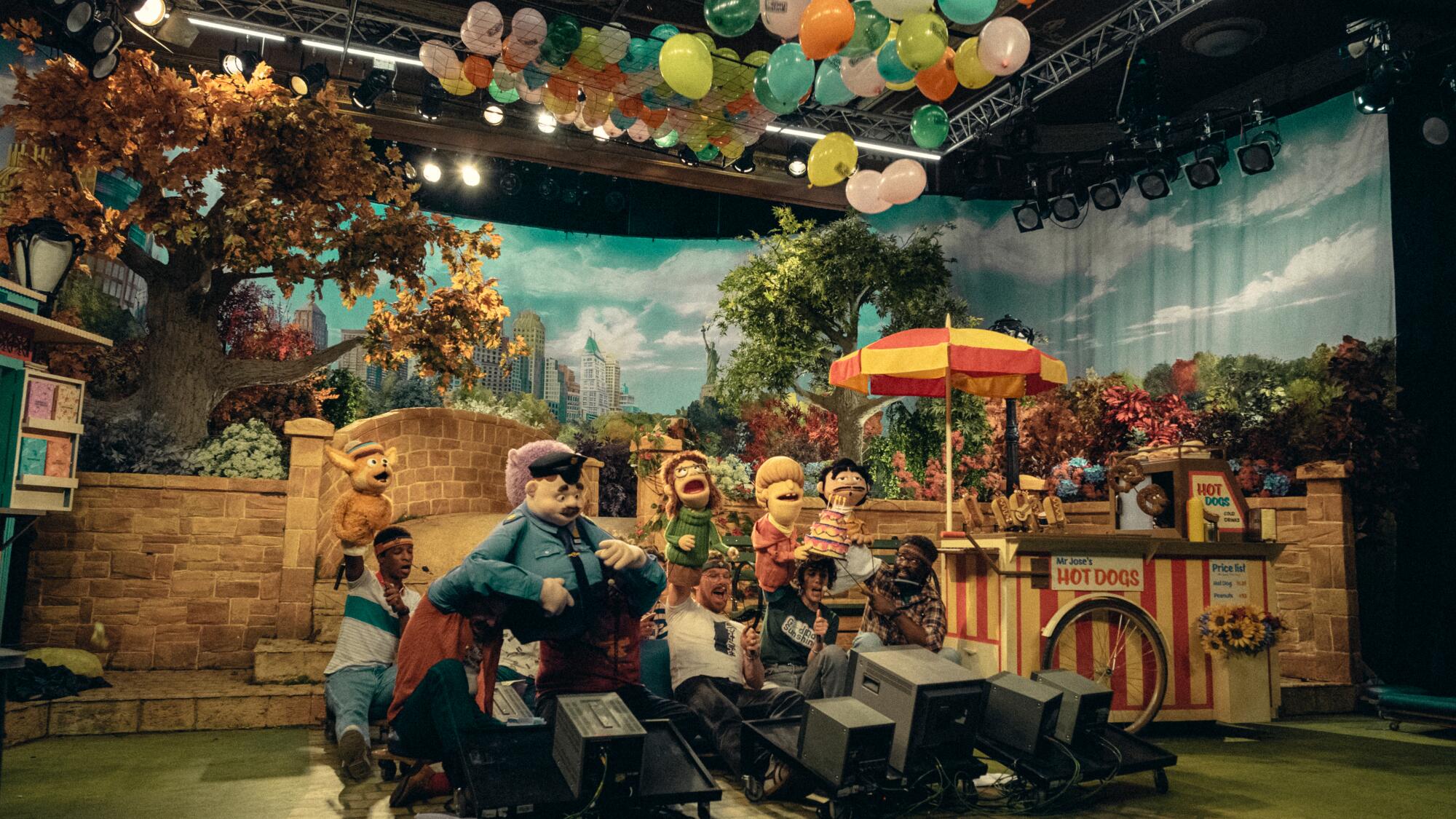
The set of “Good Day Sunshine,” the “Sesame Street”-esque show in Netflix’s “Eric.”
(Ludovic Robert / Netflix)
”That creativity is a way to liberate, heal, manage and help understand ourselves,” Morgan said. “Vincent’s desire to create a world of good, is probably one of the healthier things he has done.”
As a show within the show, “Good Day Sunshine” features an assortment of puppet characters — a mix of animals, inanimate objects and people — including one operated and voiced by Vincent, putting Cumberbatch’s chameleon voice work into practice (his eclectic credits include the dragon Smaug in “The Hobbit” trilogy and the Grinch in the eponymous 2018 animated film). Before he goes missing, Edgar observes his father at work from the sidelines and, later, watches as Vincent becomes agitated with notes from network bosses, demanding that the show broaden its appeal to get viewership numbers up, with a new puppet as a possible solution. On the subway ride home, Edgar suggests his idea for the puppet, Eric, to little fanfare from his dad.
Morgan credits series director Lucy Forbes with being a key architect behind the 7-foot monster puppet, which took roughly four weeks to perfect. Eric is a manifestation and an amalgamation of details in Edgar’s mind — a tail that mimics his cat and fur that matches the chevron of his grandmother’s mink. Vincent becomes convinced that bringing Eric to life could help bring Edgar back, and as he begins to mold the puppet from foam, Vincent also begins to hallucinate Eric, a manifestation of his inner voice, into existence in his quest to find the boy.
Cumberbatch felt the exploration of the imagined other — a device done before, including in films like “Harvey” (1950) and “Ted” — in the larger context of the story was intriguing. And bringing depth to the surreal is familiar territory for the actor, who has done green screen and motion-capture acting and understands the commitment required to make it believable. Still, as Cumberbatch tells it, acting opposite puppeteer Olly Taylor in a plush, furry costume as his character Vincent was falling apart was a surprisingly grounded experience.
“I’d often do line runs with Olly, who’s a really brilliant actor and incredibly capable puppeteer,” he said. “I tried the [Eric] voice out, I’d often read lines and sometimes not; he just got it and the rhythm was the only way it could be for Eric in that moment. It was all about trying to remind ourselves what the purpose of Eric was in relation to [Vincent’s] state of mind. At one point, I tried on the [puppet] headgear and I cried. I just had this wave of empathy for Olly and the performance he had to give in that contraption. It’s a miraculous skill.”
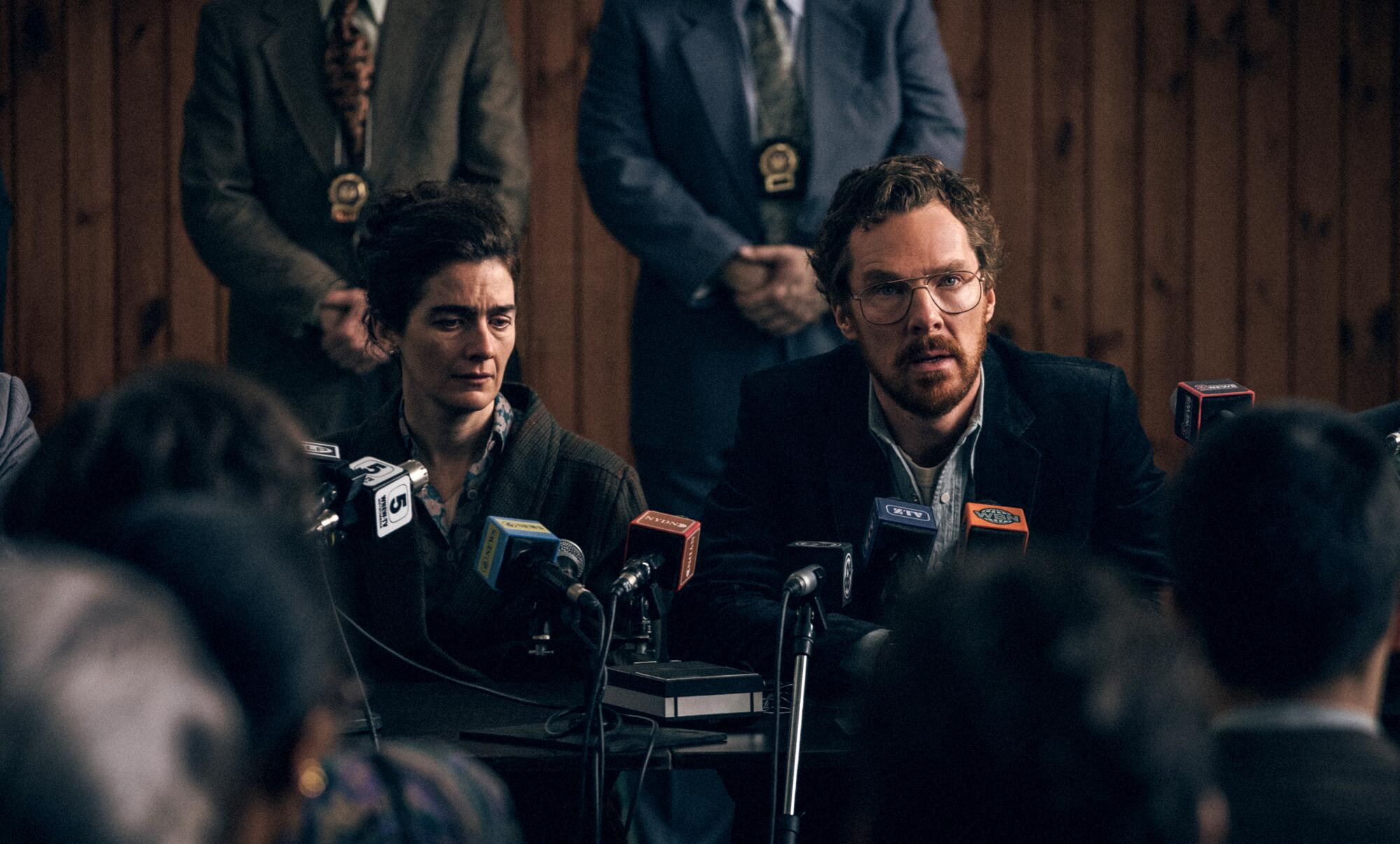
A scene from “Eric,” where Cassie (Gaby Hoffmann) and Vincent (Benedict Cumberbatch) hold a news conference to ask for the public’s help in finding their son, Edgar.
(Ludovic Robert / Netflix)
The puppet element helped soften some of the script elements for Hoffmann. As a mother of two children, the actor said she was initially hesitant about the heavy subject matter, but grew eager about its singular dynamic and the way the series explores the various breakdowns of systems, small and large. The series first captures the unraveling of a social institution — marriage — as Vincent and Cassie veer in opposite directions, and examines how their behavior negatively affects the parent-child dynamic.
“Vincent and Cassie are two very different people who are dealing with the world in two very different ways,” she said. “But I think that Cassie hasn’t been active in an honest way, on behalf of her son, for a while now — and on behalf of herself. I think that she knew that she needed to leave the marriage, and that it wasn’t a healthy environment for [Edgar]. As we come to find out, she has secrets and is in some denial. She’s not as deeply in it, and she’s not as avoidant and terrified of her emotions as Vincent is, or distracting herself with as many substances, but the disappearance… she definitely feels a sense of responsibility.”
When Morgan started to incorporate Ledroit into the story, she was determined not to make him a secondary character. She wanted Ledroit to go on his own journey, informed by his identity, and coming up against all the institutions — the precinct where he works or the gay nightclubs he used to visit — that are making him question his identity similar to Vincent. Playing a Black queer detective who is challenging the norm in the ‘80s, Belcher understood that sense of duty and purpose.
“In a story like this, it would be very easy for him to just turn into a cop that comes to work and deal with the information and solving the case. But it’s really exciting as a Black queer man, to show up with all the baggage that Ledroit would be carrying in the ‘80s, to wrestle with stuff, but to leave him in a place of action that is going to be the change.”
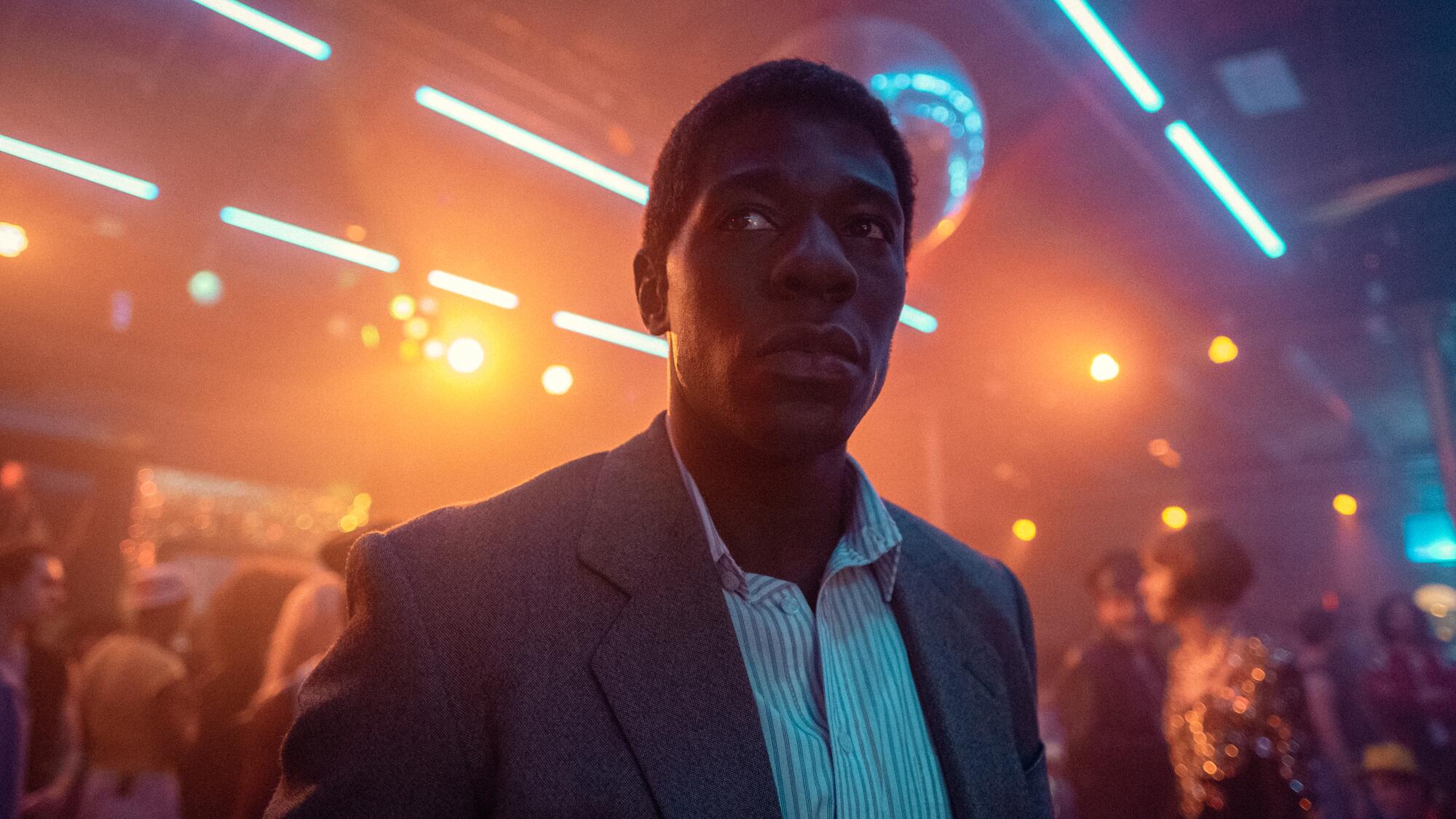
Det. Michael Ledroit (McKinley Belcher III) is charged with finding Edgar.
(Ludovic Robert / Netflix)
Belcher also acknowledged that though the Black community isn’t a monolith, they have a complicated relationship with law enforcement. He sees his character as an instrument of change within the institution.
“I think over the course of the six episodes, that’s a place he lands on: Oh, this is what’s required for us to do what we’re really here for. And it means I must call out injustice; it means I must be intolerant of corner cutting; it means I have to own who I am and stand firmly in that and stand up as a man and say ‘no,‘” he said.
The various threads in the series take some time to come together, making for a premise that can take some finesse in distilling. But that’s what the team behind the series hopes sets it apart.
“You felt held by an imagination that contained worlds within the worlds of the story,” Cumberbatch said. “It felt fresh and new — trying to explain it to people was interesting. I’ve never really heard of anything quite like this before.”
It’s why all these months later, cozy on a sofa with Hoffmann, Cumberbatch can’t help but chuckle wistfully while recalling a moment in the series that had him, as Vincent, wearing the fuzzy Eric costume and running through the streets.
“Running and running and running and running,” Cumberbatch said. “It’s the knife-edge thing with this drama; it is very f— funny, but also weirdly heroic and desperately sad and poignant.”

Movie Reviews
Movie Review – Inside Out 2
Back in 2015, Disney and Pixar introduced us to 11-year-old Riley and the squabbling emotions inside her prepubescent head. To make a long story short, Joy (Amy Poehler) tried to retain dominance over the girl, but Sadness (Phyllis Smith) kept creeping her way in. The struggle led to both emotions getting kicked out of Riley’s conscience. Following an adventure through the girl’s psyche, both emotions made their way back and Joy realized that she had to share Riley with other emotions, even unpleasant ones, in order for her to get the most out of life. In this new movie, Riley’s five core emotions want to retain dominance over the girl, but new emotions creep their way in. This leads to a struggle where the old emotions get kicked out of Riley’s conscience. They’ll have to go on an adventure through the girl’s psyche to make their way back and hopefully obliterate the new emotions. Or maybe they’ll learn to share and the message will be exactly the same as in the first movie.
For the record, I wasn’t a big fan of the first movie. Don’t get me wrong, I thought it was okay, and it kept the streak of at-least-passable Pixar alive until “Lightyear” two years ago. But setting up this elaborate world of personified emotions led to countless questions that the movie wasn’t prepared to answer, and without answering those questions, it didn’t make sense. Sometimes the nonsense played to its adventage, like a deus ex machina toward the end involving stackable crushes. Other times it hurt the movie, like leaving me wondering if these characters even had lives that were at stake, and what might happen to Riley if those lives were lost. The new movie raises more new questions than it answers, but this time I’m a little more comfortable knowing that the movie is prepared to answer some questions and not others.
For the new movie, Riley (Kensington Tallman) is going to hockey camp with her best friends Grace (Grace Lu) and Bree (Sumayyah Nuriddin-Green). Joy is looking forward to guiding her, along with core emotions Sadness, Anger (Lewis Black), Disgust (Liza Lapira), and Fear (Tony Hale). But Riley hits puberty the night before the camp, ushering in new emotions Anxiety (Maya Hawke), Envy (Ayo Edebiri), Embarrassment (Paul Walter Hauser), and Ennui (Adele Exarchopoulos). Anxiety proves useful in a few social situations, but clashes with Joy when the latter wants Riley to stay loyal to her old friends, as opposed to endearing herself to the more popular Val (Lilimar). The new emotions banish the old emotions to the back of Riley’s mind until she can be completely reworked.
My problem with the movie, other than that the story progression is pretty much the same as the first movie, is once again at the literal level. I can understand a kid with conflicting emotions, but what happens when a kid is missing five of them, as is the case here? If Riley is being controlled by the four new emotions, what’s making her competent at hockey? And why do the filmmakers think that Anxiety doesn’t manifest until puberty? What are young kids famous for saying on car trips? “Arewethereyet? Arewethereyet?” That’s Anxiety, guys.
Of course, just as the “Inside Out” movies teach audiences to take the bad with the good, I must remember to take the good with the bad. And there is a lot of good here. The animation is as colorful and delightful as ever, the emotional moments had me feeling for the characters, and the humor consistently hits. My favorite gags involve cartoon characters stuck in the back of Riley’s mind. Video game character Lance (Yong Yea) is another helpful crush of Riley’s, Pouchy (James Austin Johnson) is a little too happy to provide explosives, and Bloofy (Ron Funches) is a fourth-wall breaker with no fourth wall to break (you can practically hear the Disney writers saying, “Take that, Nickelodeon!”). These characters, more than the emotions, were the highlight of this passable Pixar affair.
Grade: B-
“Inside Out 2” is rated PG for some thematic elements. Its running time is 96 minutes.
Contact Bob Garver at rrg251@nyu.edu.
Entertainment
Leo Woodall stays grounded after 'One Day,' even as more hearts are fluttering
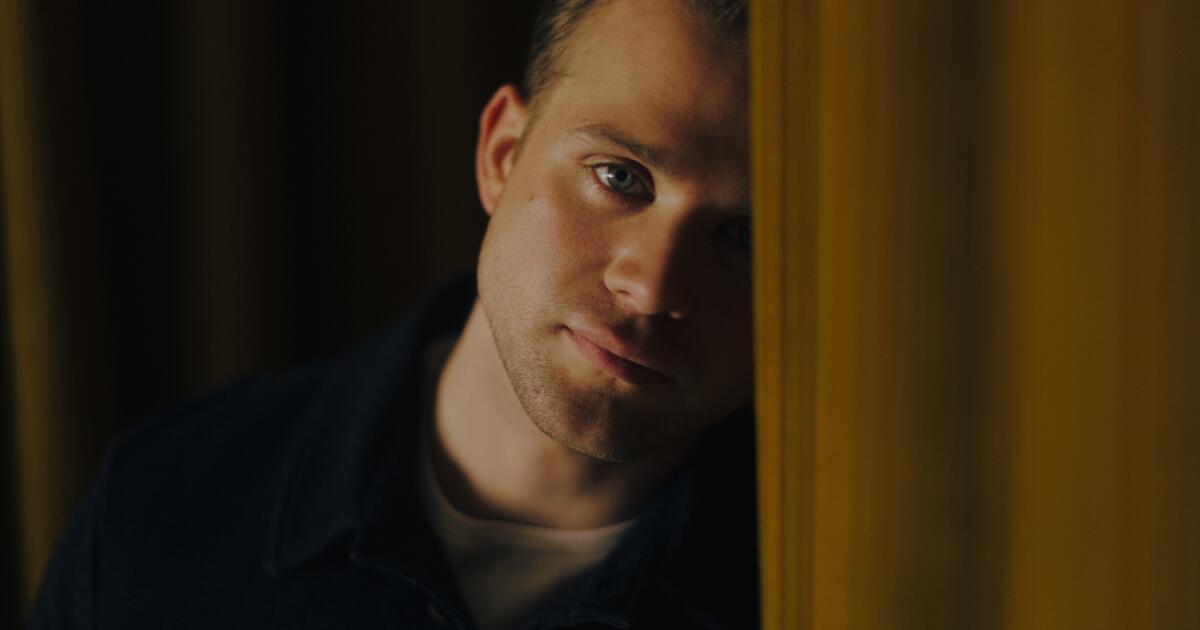
“I haven’t seen this one specifically,” Leo Woodall says as a sheepish smile — the one that has made a fair number of hearts flutter since Netflix dropped its adaptation of the angsty romantic drama “One Day,” in which he stars — stretches across his face.
Woodall is well aware there is a trove of TikTok videos that document viewers’ intensely emotional response to the series, which chronicles the 20-year torturous slow burn of unlikely friends Dex (Woodall) and Emma (Ambika Mod). His friends have passed some on, he says. But after pleasantries are exchanged at the start of this video call on a mid-May morning — with Woodall beaming in from London — I share my screen to guide him through a TikTok sampler of heartache that has been recorded.
He lets out an enthusiastic chuckle as he braces for impact.
There’s a young woman, draped in a green blanket, in various states of complete anguish. Another video is a close-up shot of a young woman wiping tears from her face while watching an early interaction between Dex and Emma with the caption: “Me 2 days later still crying watching edits.” The final video features a viewer who has just completed the series, camera turned to her face as she lies in utter despair against a pillow. One by one, Woodall lets out a guilty whimper or “Oh, noooo!” as he screens them.
“We could watch these all day,” Woodall says as the brief presentation nears its end.
“I was just very intrigued and anxious to know what people thought and how they were responding to it,” Leo Woodall says of the launch of his “One Day.” He needn’t have worried.
(Jennifer McCord / For The Times)
“In the beginning, when the show came out, I was trying to keep up with some of the reactions to it,” he adds. “I was just very intrigued and anxious to know what people thought and how they were responding to it — if they responded to it at all. But there’s something cathartic and therapeutic about it. Everyone needs a good cry. We spend a lot of our time watching things, and you don’t always have a real, emotional reaction. And I think the show really succeeded in lancing its way into people’s hearts.”
It’s also helped the actor’s rising profile, taking him from a virtual unknown to an international heartthrob. After a key supporting turn in the sophomore season of HBO’s “The White Lotus,” playing the alleged “nephew” of a gay man trying to scam Jennifer Coolidge‘s wealthy character, the 27-year-old actor sent the internet into emotional freefall in February with the launch of the adaptation of David Nicholls’ bestselling novel. In the melancholic, angst-ridden friends-to-lovers tale — previously adapted for the big screen in 2011 with Anne Hathaway and Jim Sturgess — Woodall’s Dexter is privileged and charismatic but emotionally tortured as the series chronicles his evolving friendship with his witty and stubborn BFF across two decades on the same day.
“There’s definitely a kind of projection that people put on you,” he says. “I myself have done it with actors that I’ve watched. It’s just a natural thing that you do. Being on the other end of it was kind of a strange feeling. You just can’t take it too seriously. You have to find it funny and just get on with your life a little bit. Giving it too much attention is not something I would want to do. It’s just a funny part of life now.”
Not that Woodall has had much time to make sense of the attention. Soon after “One Day” premiered, he took a breather from Instagram: “My followers were going up and up, and I was like, ‘Oh, cool.’ But then I was like, I’m going to put my phone away.” He also began production in Budapest, Hungary, on the Nazi drama “Nuremberg,” a film whose cast includes Russell Crowe, Michael Shannon and Rami Malek. With that now wrapped, he’s begun work on the fourth installment of “Bridget Jones’s Diary” opposite Renée Zellweger.
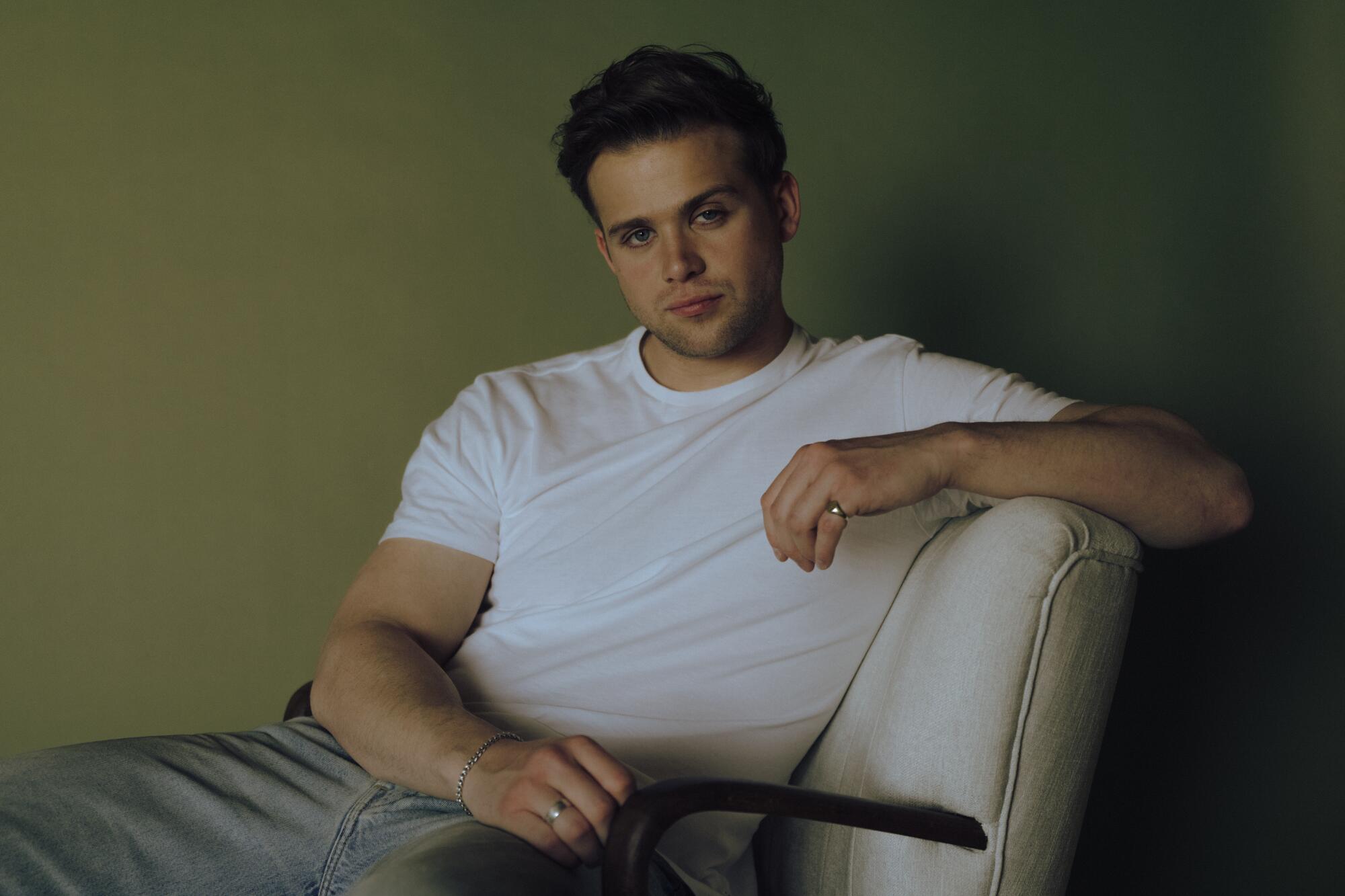
Next up for Leo Woodall? Appearing in the upcoming “Bridget Jones: Mad About the Boy.”
(Jennifer McCord / For The Times)
Although Woodall comes from a family of actors — his parents met at drama school and he is a descendant of silent film star Maxine Elliott — he hadn’t always dreamed of pursuing life as a performer. He thought maybe something sporty was in his cards. Then he discovered “Peaky Blinders” and “Skins,” and the curiosity kicked in.
“I just remember I was in a gap year, working in a bar, not doing anything of great worth for my future, and I guess I started just kind of thinking about it,” he says. “It was a few things: It was ‘Peaky Blinders,’ also ‘Skins.’ I watched the two seasons that Jack O’Connell was in. I remember seeing his character and being like, ‘Whoa, that’s fun. Whatever he’s doing, that’s cool.’ I started looking into how he got to where he was and his road to playing that character. And yeah, watching ‘Peaky Blinders’ and just felt like doing a Tommy Shelby (Cillian Murphy) impression in the mirror. [Laughs] I had the hat, and I was like, ‘Screw it, no one is looking. I’ll just do it.’ It’s so embarrassing. I would start improvising in the world of ‘Peaky Blinders.’”
He graduated in 2019 from Arts Educational School, where he studied acting, before landing minor roles in such TV shows as “Vampire Academy” and “Citadel.” He was filming “The White Lotus” when he watched the film version of “One Day” as prep work for his audition: “I didn’t know how it was gonna end,” he says. “And I remember I was in my kitchen cooking something, and I turned my eyes away for a second and I look back and Emma had been hit. And I was like, ‘What the f—? How could you do us like that?!’”
It added to his intrigue of, as he describes it, “a love story that wasn’t really just a romantic story. It’s about these two people who grow up together, and also apart. It’s about their friendship more than it is about, ‘Are they gonna get together?’ I know that is a huge part of it, but you do just see a real friendship.” Then there’s the complexity of Dex’s journey.
“He’s unbelievably fragile and vulnerable,” he says. “I think there’s a perception of him — not just from the people within the world of the story but people who have now seen the show — that he’s got kind of a reputation and you learn as you go on that he’s very insecure, he’s lonely a lot of the time. He just wants to be connected to the people that he cares about. He gets in his own way a lot of the time. But truthfully, he’s just someone who has a big, big heart. And it gets broken more than once.”
Woodall humbly scoffs when asked what he’s learned about what goes into playing a leading man — “Oh, I still don’t know. Honestly, there’s so many things to figure out still. The very beginning of shooting, I didn’t exactly know which foot to put forward. Then I was like, ‘Just do your job and be nice.’” But he’s enthusiastic about this chapter in his story.
“It’s pretty sweet, pretty fun,” he says. “I’ve been away from home for a very long time, and that can have its effects on your happiness. So I’m back in London now, and I’m very happy to be back and see all my people and still work. I hope that I can keep it up. That’s the game of acting, you just never know. There is a momentum that exists.”
Movie Reviews
Short Film Review: Willow and Wu (2024) by Kathy Meng
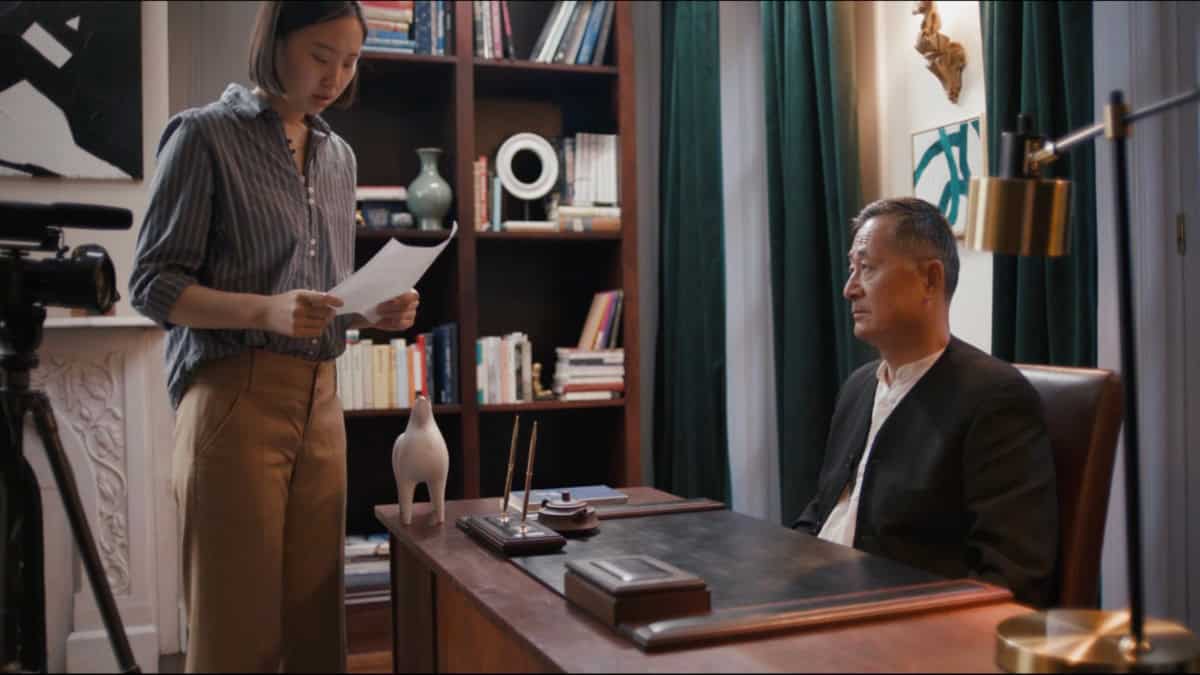
“Very few friends travel through a lifetime with you”
Fourth film by Kathy Meng, following “Elite Match”, “Willow and Wu” is a film shot in NYC, which has won the award for Best Screenplay at 27th Brooklyn Film Festival.
The film begins with a rather intense scene, where Waley seems to be breaking up with a girl through a video call. The girl’s cries following the call cements the fact, while the next scene has her, Willow, in an obviously depressed state receiving a call from Mrs Wu, her boss, insisting that she comes to her house right away. It turns out that although she is her assistant, Willow has to help her husband this time. Mr Wu wants to be filmed on a script his wife wrote and wants Willow to handle the recording. With her not having prior experience and being quite anxious, things do not go exactly smoothly.
Moreover, the video seems to focus on the passing of his friend Bao and soon asks her to read the script, before he decides to shoot the whole thing outside, even asking her to put some make up on him. It turns out that he is also anxious, which is why he appears so demanding. Eventually, loss brings the two closer.
If you like Willow and Wu, check also this review
Kathy Meng follows the film-about-film meta trope in her short, in order to present her comments. Loss, and how difficult it can be for people to express it is the main one, but there is more. That people who appear being difficult or even unlikeable can actually have reasons for being that way is also commented upon, as much as how opening up can help overcome psychological issues. That both protagonists benefit from this last aspect adds to the particular remark. Lastly, one could say that Meng also comments on how acting works, and how directors can cooperate with the actors in order for the latter to perform they way they expect them to.
Although there is a dramatic base here, Meng instead opts for a more happy-go-lucky approach, which works quite well in general, particularly during the finale in the park, which is surprisingly cheerful. Aolan Guo’s smile as Willow, who gives an overall excellent performance, will definitely stay on the mind of any viewer, as will Yves Yan’s actual performance in the end, as Wu. Overall the acting is on a high level here with the two protagonists’ chemistry also being of the highest level.
Sancheev Ravichandran captures both the interiors and the exteriors shots with realism, without any particular exaltation, with the close-ups working well. Remy LaFlamme’s editing results in a fast pace that allows the full story to be leisurely told in just 13 minutes.
“Willow and Wu” is a very appealing short that manages to tell a full story in rather economical and entertaining fashion. I think Meng is ready to transition to features, as I think she would be quite good in a family drama.
-

 News1 week ago
News1 week agoWould President Biden’s asylum restrictions work? It’s a short-term fix, analysts say
-

 Politics1 week ago
Politics1 week agoNewson, Dem leaders try to negotiate Prop 47 reform off California ballots, as GOP wants to let voters decide
-

 World1 week ago
World1 week agoDozens killed near Sudan’s capital as UN warns of soaring displacement
-

 News1 week ago
News1 week agoRead Justice Clarence Thomas’s Financial Disclosures for 2023
-

 World1 week ago
World1 week ago‘Bloody policies’: Bodies of 11 refugees and migrants recovered off Libya
-

 Politics1 week ago
Politics1 week agoGun group vows to 'defend' Trump's concealed carry license after conviction
-

 Politics1 week ago
Politics1 week agoShould Trump have confidence in his lawyers? Legal experts weigh in
-
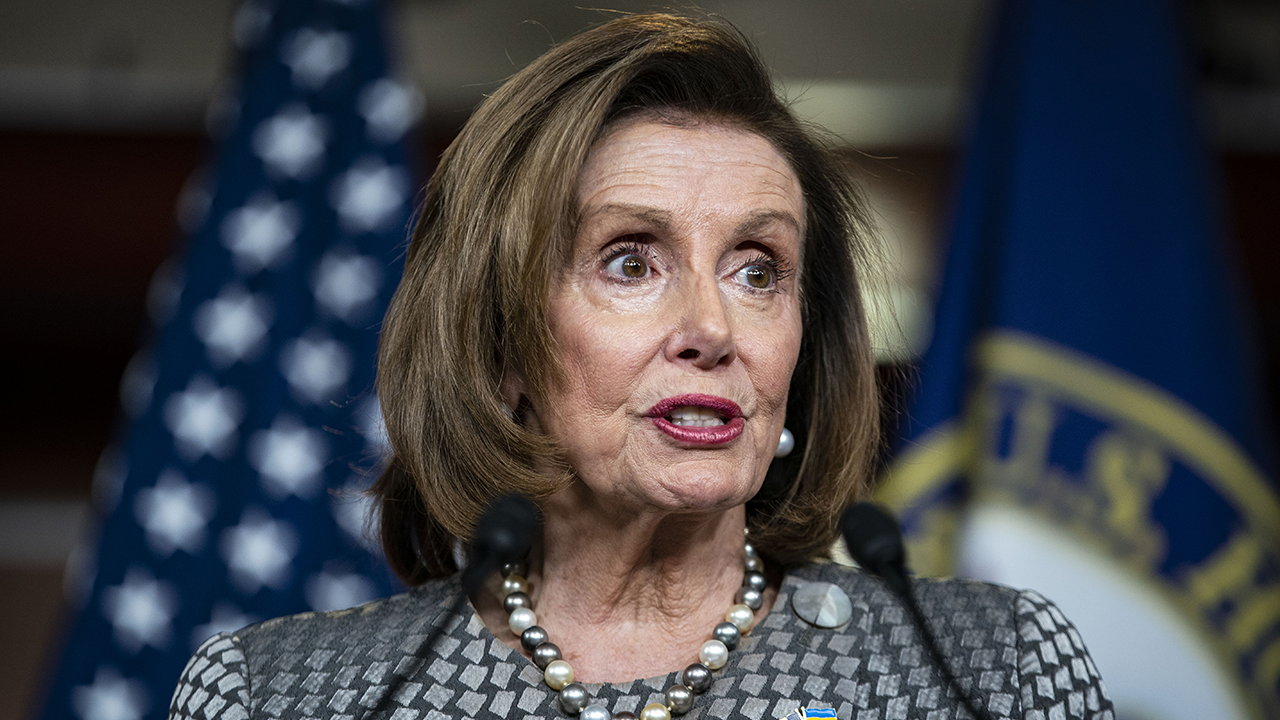
 Politics6 days ago
Politics6 days agoGOP releases Jan. 6 clip of Pelosi saying 'I take responsibility' as she discussed National Guard absence

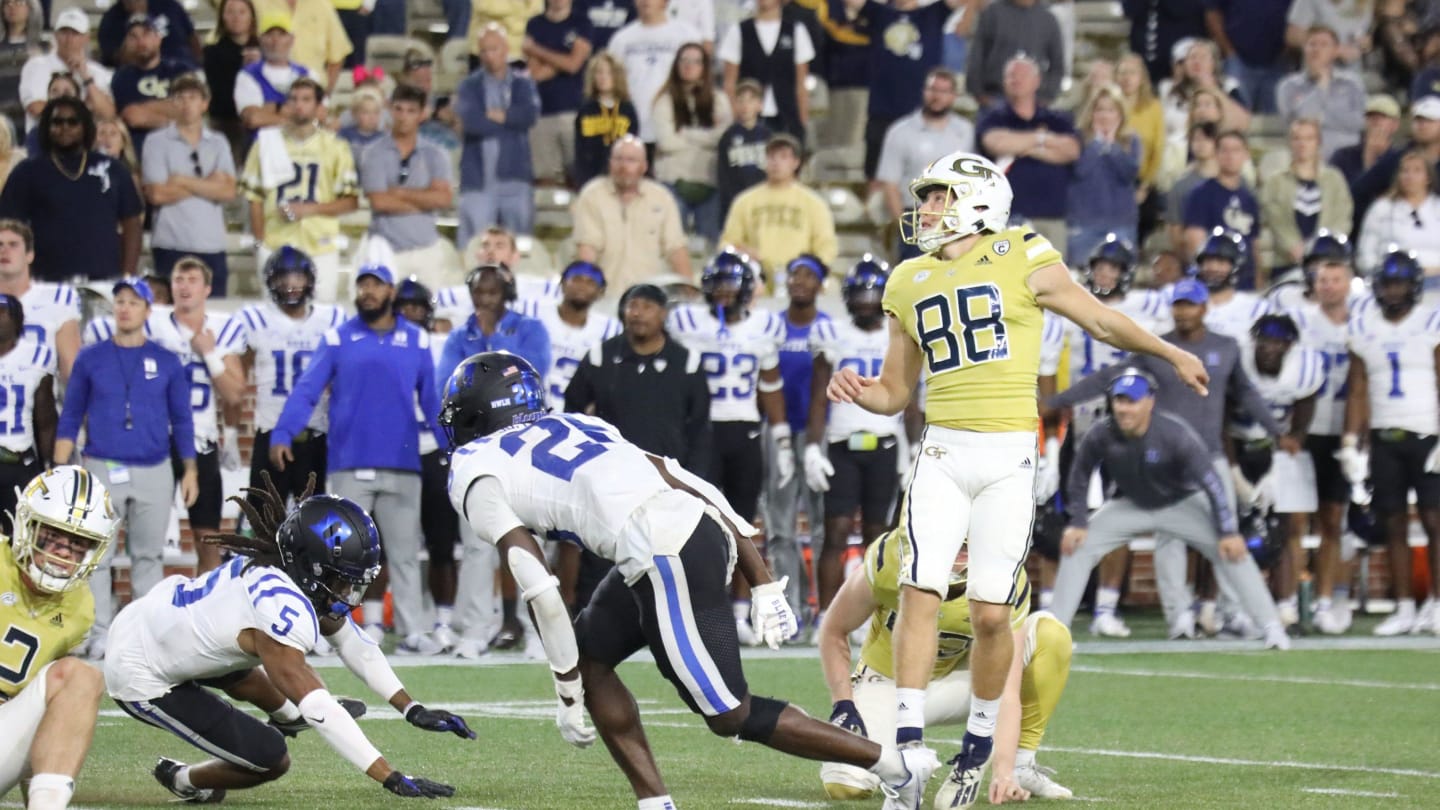

:quality(70)/cloudfront-us-east-1.images.arcpublishing.com/shawmedia/VQCTU2CNN5Y5TYBSTTH7WEGK3Q.jpg)







